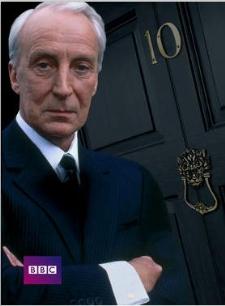On February 1, Netflix is premiering an adventurous undertaking, a made-for-Netflix series to stream, House of Cards, to star Kevin Spacey. I have mixed feelings about it.
On the one hand, I applaud anyone undertaking such an adventurous enterprise and opening a new market for production. If it succeeds, I think it can lead the way much sooner than later to a form of distribution that appears to be the feature. This not only can help break the stranglehold on movie and TV production that the studios and networks hold, but also opens a venue for rich material made for an audience often ignored. In fact, further, the service has given House of Cards impressive artistic control, something that never happens on networks and with studios, who are always jumping in with executives giving "notes."
On the other hand, the British mini-series this is based on is one of my favorite of all-time, and there's the challenge of reaching the standard of the honored original. That's not a completely fair statement to make, sight unseen, and it could be very good on its own merits, even if not "as good," which ultimately is personal taste. But further, regardless of its quality -- and for all I know it will be wonderful -- it's hard on a purely personal level to simply want to see a "reinvention" (as they're calling it) of something that's so indelible to oneself.
To be clear, the questions I have about the new U.S. version are as much objective as subjective. To start with, the British series has at the core the British class system, which doesn't exist in the U.S. Plus, there are levels of high power in British politics that are appointment-based or done through backroom negotiations, as opposed to purely electoral. Related to this is the British monarchy and hereditary inheritance of authority which plays a significant part in the trilogy, especially part two, To Play the King. There's nothing equivalent in the U.S. Also, the lead of the British series, phenomenally played by Ian Richardson as 'Francis Urquhart' is an elderly and benign-appearing man on the outside, which makes his hidden malevolence so chilling. (There's more to say about this, but that would give too much away). By contrast, Spacey is in the prime of life. And finally, the British three-part series (based on three novels) ran about 12 hours. The American version will be 26 one-hour episodes, so the question becomes will it be dragged out too long, too thin, and get audiences anxious for it to move on?

In fairness, I have no idea. It might be brilliant. The source material certainly is. (Interestingly, the original novel, House of Cards by Michael Dobbs was intended as only one-novel deal. Only later did he expand the story to add the two later books, ending with The Final Cut.
(The series was adapted by Andrew Davies, a brilliant writer whose many TV works include Middlemarch, Little Dorrit, Bleak House, Sense and Sensibility, A Room with a View, Dr. Zhivago and probably 40 more. His feature films include co-writing Bridget Jones Diary, Brideshead Revisted, and The Tailor of Panama. )
Just so you know it's not my opinion only how utterly great the British trilogy was, House of Cards has 8.9 stars on iMDB out of a possible 10. None of the three has lower than 8.1. It won a Peabody Award, an Emmy for writing, and Ian Richardson won two Best Actor BAFTA Awards. The British Film Institute named it the 84th greatest British TV programme ever.
Great as it is, it's not for everyone. It's very dark, very cynical, and at times hilarious, even when your laughing at painful manipulation. How march of this darkness and soul-crunching cynicism will carry over to the U.S. version, time soon will tell.
One thing that absolutely must (and will therefore) carry over is the repeated line that became famous in England. It comes whenever the character of 'Urquhart' has been asked a painfully embarrassing question about someone -- usually that he wants asked and may have planted. The character often addresses the camera directly, and at this "awkward" times he would, "You may very well think that. I couldn't possibly comment."
In the end, I suspect that the filmmakers of the U.S. version know the legacy they're carryiny, and will do an intelligent, well-crafted job. The end results will be known soon enough. And it's heartening to know that the team behind this is so high-end -- from executive producers David Fincher (director of The Social Network, who shot the pilot) and Eric Roth (Oscar-winning screenwriter of Forrest Gump), to writer Eric Willimon (the wonderful political thriller, The Ides of March), who wrote the initial 13 episodes. I can't say I'll watch, even if it's wonderful, simply because of the profound memories I have of the original -- but I'm flexible on that, and will happily applaud their success if they pull it off. And in the end, I do hope they pull it off, because being successful in this venture has far too many benefits.
For those interested is watching the original, it's available on Netflix.
*
To read more from Robert J. Elisberg about this or many other matters both large and tidbit small, see Elisberg Industries.
